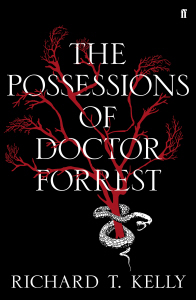 I was extremely glad of a review of Doctor Forrest in the Guardian yesterday, and by the acclaimed novelist Toby Litt, no less. To speak of just one gratifying aspect, quite early on in the write-up Litt makes a comment that reflects or sums up much the greater part of my reason for writing the novel in the first place:
I was extremely glad of a review of Doctor Forrest in the Guardian yesterday, and by the acclaimed novelist Toby Litt, no less. To speak of just one gratifying aspect, quite early on in the write-up Litt makes a comment that reflects or sums up much the greater part of my reason for writing the novel in the first place:
“If you’re looking for a yarn about making a dodgy deal with the devil, a fast-paced pitch-black romp through some familiar spooky locations and situations, you won’t be disappointed.”
Litt goes on to make some very thoughtful and astute comments on the subject of the gothic as a genre, Forrest‘s particular take upon it, and the takes of some other writers of more recent vintage and much more distinguished than I (Angela Carter among them.) I was especially interested to see his comments on the way in which the novel’s various narrators all write “in what you might call a gothically appropriate way… as if [] they are collaborating in creating a stonking old-fashioned yarn.” That suddenly made me wonder what the novel would have been if the narration had been more of a ‘mash-up’: different, for sure, and probably more of an ‘experiment’.
But as with the experience of my first novel Crusaders I am once more brought face to face with my fundamental old-fashioned-ness. If this book is read as ‘an old-fashioned moral treatise on vanity’ I couldn’t really disagree for one minute. But of course it’s as much a matter of style as of theme. For instance Litt notes that the present day setting of Forrest is one ‘where everyone is keeping secret journals – page after page of descriptive prose – and writing letters, and no one is social networking or sending emails or recording their life in a non-anachronistic way.’ And that put me in mind of something someone said about Crusaders, how the novel didn’t seem to have nearly enough of the backdrop of mid-1990s pop culture in it. I should say that with Forrest I did always have it in mind that the entirely epistolary Chapter 21 was an exchange of emails rather than handwritten and posted letters – but I just didn’t feel like presenting it that way on the page. Another bit of private thinking I chose not to share with the reader was that the book is, to my mind, set round about 2007 rather than 2011, which places it just a bit prior to the eruption of Facebook and Twitter.
Nevertheless, I have to be honest and say I’d have had not the slightest idea how to manage the specific tone I had in mind for this novel without a certain purposeful scouring away of The Way We Live Today. Really it’s as I said to Glennis Byron in the interview she kindly ran at the Gothic Imagination site last month: the ‘nineteenth century boy’ is me. Similarly there was – there is – another version of Forrest that ought really to derive its horror from stem cells and gene therapy, or at the very least from full-face transplant. As I told Glennis: “I feel a tad guilty in that the world of hi-tech surgery could easily lend itself to a gothic where the horror is explicitly born of science a la Frankenstein or Jekyll and Hyde. But then I’m one of those heretics who can’t believe in God but is fairly convinced of the Devil…”



